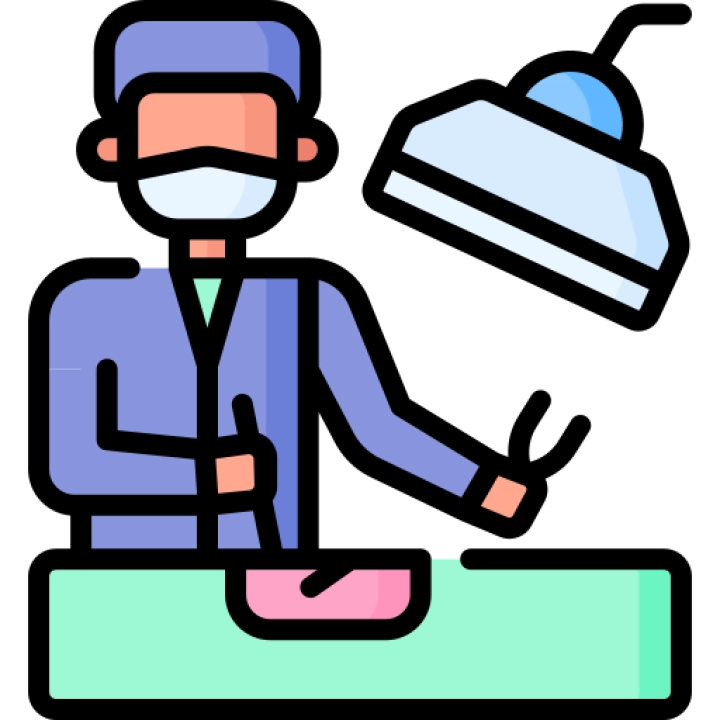College: Vocational School
The Surgical Services specialization focuses on the principles and practices of surgical care, including preoperative, intraoperative, and postoperative management. Students acquire skills in surgical techniques, patient care, sterilization, surgical instruments, and operating room management, preparing for careers in surgical nursing, surgical technician roles, operating room management, and related healthcare areas.
Learning Objectives:
- Understand the principles of surgical care and patient management.
- Develop skills in surgical techniques and instruments.
- Learn patient care protocols and safety in surgical settings.
- Explore sterilization practices and infection control.
- Analyze operating room management and team dynamics.
- Develop critical thinking, problem-solving, and clinical skills.
- Gain practical experience through clinical rotation and internships.
Main Outline:
- Introduction to Surgical Services - Overview of surgical care principles, history, and current trends.
- Surgical Anatomy and Physiology - Basics of anatomy and human physiology related to surgical procedures.
- Surgical Techniques - Principles of basic and advanced surgical techniques.
- Patient Care in Surgery - Protocols for patient care before, during, and after surgery.
- Sterilization and Infection Control - Techniques to ensure sterilization and prevent infection in surgical environments.
- Surgical Instruments - Understanding surgical tools and equipment handling.
- Operating Room Management - Principles of managing surgical teams and operating room environments.
- Surgical Pharmacology - Basics of medications used in surgical settings.
- Emergency Surgical Care - Techniques for managing surgical emergencies and trauma cases.
- Surgical Specialties - Exploration of various surgical specialties such as cardiac, thoracic, orthopedic, and neurosurgery.
- Clinical Training - Practical experiences in hospitals, surgical centers, and clinics.
- Internship - Hands-on training in surgical environments under the supervision of experienced professionals.
- Graduation Project - Comprehensive project applying surgical services skills, such as developing a surgical care plan, conducting patient care analysis, or managing an operating room scenario.
Assessment Methods:
- Surgical care principles analysis
- Anatomy and surgical physiology projects
- Surgical techniques projects
- Patient care in surgery projects
- Sterilization and infection control projects
- Surgical devices projects
- Operating room management projects
- Surgical pharmacology projects
- Emergency surgical care projects
- Surgical specialties projects
- Clinical rotation reports
- Internship reports
- Graduation projects and presentations
Recommended Textbooks:
- "Introduction to Surgical Services"
- "Surgical Anatomy and Physiology"
- "Surgical Techniques"
- "Patient Care in Surgery"
- "Sterilization and Infection Control"
- "Surgical Devices"
- "Operating Room Management"
- "Surgical Pharmacology"
- "Emergency Surgical Care"
- "Surgical Specialties"
Prerequisites:
Basic knowledge of biology and anatomy with an interest in surgical care and patient management.
Program Duration:
Usually takes two to four years to obtain an associate or bachelor's degree in surgical services, depending on the program and institution.
Certification:
Graduates can obtain certifications such as:
- Certified Surgical Technologist (CST)
- Certified Surgical First Assistant (CSFA)
- Certified Registered Nurse Anesthetist (CRNA)
- Certificates in specific surgical specialties and techniques
Target Audience:
Aspiring surgical technicians, surgical nurses, operating room managers, and healthcare specialists seeking to work in hospitals, surgical centers, clinics, and related healthcare settings.
This specialization equips students with the clinical, technical, and managerial skills required to excel in surgical services, supporting careers in various roles within hospitals, surgical centers, clinics, and related healthcare settings. The program provides comprehensive education in surgical care principles, anatomy, surgical techniques, patient care, sterilization, devices, operating room management, pharmacology, emergency care, surgical specialties, and hands-on experience through clinical rotation and internships, preparing students for successful careers in the field.

